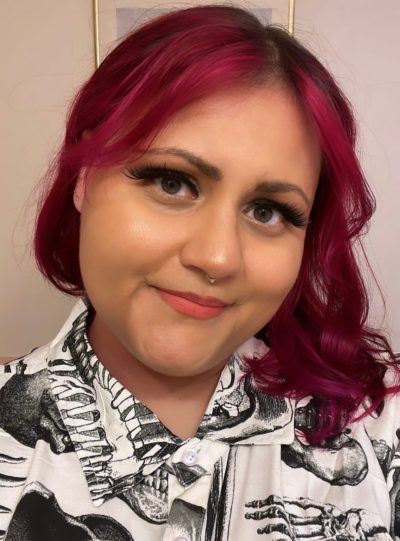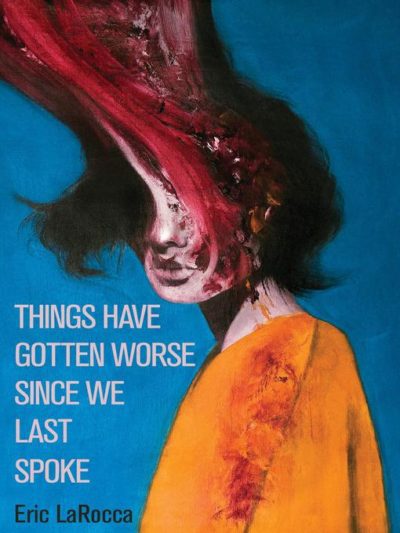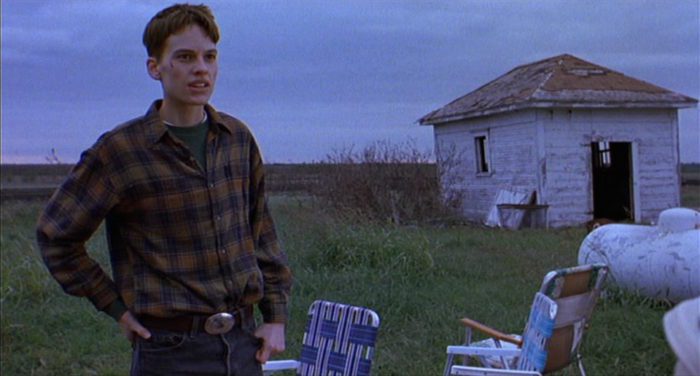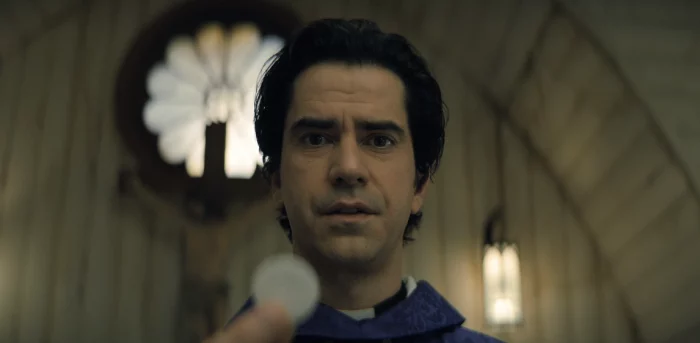Mae Murray (she/they) is a writer and creator of The Book of Queer Saints anthology. She also runs the Horror Writers Support Group (which I am a member of) that meets twice a month over Zoom to chat and give each other advice. Over the past few months, Mae and I have become good friends, with our shared love of queer horror and similar experiences as former Mental Health Peers. I sat down with them to talk about the upcoming anthology, releasing on March 29, and how the queer community changes with each new generation.
Lor Gislason: First off, how are you doing today?
Mae Murray: I’m good! I’m tired–but I’m always tired. It’s two weeks until the book is out there for everybody… So, [sigh] I’m a little nervous but I’m doing good.

Lor: I’ve seen some early readers and everyone seems to be reacting well!
Mae: Yeah, the only bad thing I’ve gotten was somebody from Twitter who hadn’t even read it and they were like, “I’m not paying 10 dollars for this.” [Laughs] I was like “I don’t know you and you don’t have to!”
Lor: That’s just the price of a book!
Mae: Yeah, for eight months of work it’s a pretty good deal in my opinion! I ended up ignoring it and I’ve made a deal with myself that I’m just going to not respond to any kind of negativity that comes my way from this.
Lor: The number of positive reactions has been huge, so hopefully the negative ones are low.
Mae: Yeah, I think it’s going to be positive. Eventually, if it really gets out there it’s going to attract a lot of queer people (and people in general) who don’t understand the message or take the message as an insult to their beliefs, but…There’s nothing I can do to control that. All I can do is just keep making the kind of art I like to make. And there’s clearly an audience (for Queer Saints).

Lor: Wasn’t the idea behind it the response to Eric LaRocca’s Things Have Gotten Worse Since We Last Spoke?
Mae: Yeah, I think it’s pretty much public knowledge at this point that Eric LaRocca’s book went viral on TikTok and there was a harsh backlash that resulted in a lot of–You know, it creates a lot of pain not just for the creator but for the community of people who loved the book and saw themselves represented in it somehow. So this book is a direct response to that situation. It came from a random Twitter conversation with Sam Richard, the original publisher of Things Have Gotten Worse Since We Last Spoke, and Eric Raglin (Cursed Morsels Podcast and Press) who wasn’t involved with THGW but is a friend of Sam’s. So I saw them chatting on Twitter and kind of jumped in and said it would be really funny if we made an anthology called The Book of Queer Saints–but it was all really terrible people! It was just an off-hand joke but they both said actually yeah that would be really cool, but neither of them had time for that. And I was like…I have time! That’s how it came out. I thought: actually I DO want to make this because I think it’s important.
Lor: How quickly was it going from that conversation to the Kickstarter?
Mae: It all happened very quickly; from that conversation to the Kickstarter was about 3 or 4 weeks. In that time I was coming up with the budget, business plan, and advertising because I’m the kind of person where if I’m going to do something I want to be very prepared and I want to make sure I’m doing everything so it gets done. I don’t like to promise something and then not deliver.
Lor: Did you have any experience with crowdfunding or business before this?
Mae: Well, I’m a poor person–so I have a lot of experience being resourceful [laughs]. I think it also helps that my partner works with an Autism charity, so he spends a lot of time helping raise money for his organization and I think a bit of that has rubbed off on me. The strategy of how to get support for something.
Lor: We’re in the same Twitter circles so seeing everyone talk about it was really great. I’m guessing once you started putting together the project you reached out to Eric LaRocca and asked if he wanted to be a part of it?
Mae: Yeah my first step was going “what writers would really believe in this project?” and obviously Eric LaRocca is the first person I went to. Then of course Hailey Piper (Queen of Teeth) and Joe Koch (The Wingspan of Severed Hands)…it’s such a dream that they wanted to do it. I can’t tell you how much of a fan of Hailey’s I am [laughs]. So the plan was to get some credible writers behind the project–not just for credibility but because they write the kind of things that I love. Initially, Eric had so much on their plate after THGW that they weren’t sure if they would be able to contribute, and felt really bad about it. Then later they came back on board and said “This is important to me, and this is something I believe in. I want to be a part of it and I’m going to make time for it.” So that was a really special moment.
Lor: Eric LaRocca JUST had another book come out! (You’ve Lost a Lot of Blood) and both you and them have so much on the go and I think “when do you sleep?!” For myself, I find that kind of busy can be nice, but also very exhausting.
Mae: I think you know that when you ask me how I’m doing I always say I’m tired [laughs]. And I’m conscious of that. It’s not just the work aspect, it’s the stress that keeps you up at night. Even if you want to slow down you can’t.
Something that I want to talk about and bring more awareness to is the fact that no.1: if you have a chronic illness like I do–there’s this thing that looms over you–that my lifespan is shorter. This is just a fact–that I might not live as long as other people and not have as much time as them. So I feel a lot of pressure to get as much done as possible. But then there’s a balancing act of “am I enjoying my time on this Earth?” [Laughs] I love reading and writing and I love what I do, and that’s why I do it but there’s also a flip side where I have to question if I giving enough space to myself; because that’s the advice I would give you or anyone that came to me. Are you honouring your full self, are you giving enough space to yourself, etc. It’s a hard thing to contend with.
Lor: You and your partner went away for a weekend recently though, yeah?
Mae: We did! We got a really good deal on a hotel recently and it had a hot tub. I have lupus and my joints are f-ed [laughs]. I’m in pain a lot of the time. So getting a hotel with a hot tub is always on my checklist. It helps a lot. So I got to do that this weekend and it was so amazing.
Lor: Something I wanted to talk about was that we grew up around the same time and I feel like the gay and queer community was so different back then to what it is now. I didn’t have a cell phone until after I graduated and it was just a flip phone. Smartphones weren’t a thing until years later. I remember I was terrified to tell people I was gay because it was a small town. We had a new class called Social Justice and I ended up doing a presentation on Matthew Shepard. Nobody knew who he was or why it can be scary to be gay in a small town so I think that was an eye-opening experience for them. So I’ve been thinking about how queer kids are these days–and it’s like a weird disconnect almost, and I feel old [laughs]. I don’t know how to combine these two viewpoints and balance them.
Mae: I totally get that, I had the same experience. When I was in high school my dad gave me his old flip phone, and the only thing it could do was make calls to him [laughs]. I didn’t have a phone that could text until college. Things were different [back then] and I think that’s why we’re having this clash. A lot of the backlash for Eric LaRocca’s book came from the younger generation, and the people who connected with it are people who grew up in chatrooms like we did.
Chatrooms were a new thing and you could go on and talk to literally anyone. I know as a young queer person I was sneaking into chatrooms at my friends’ houses and doing some weird shit, you know? [laughs] And when I read Eric’s book from that point of view it’s so relatable because you don’t know who you’re getting involved in a chatroom–there’s this anonymous person you built a connection with. It’s not like Twitter or Facebook where you see a person’s face..it’s just wholly its own thing. I think young queer people connected with each other that way originally in the technology world. I think that’s why it’s hard for people to understand why their relationship [in the book] moves so fast. That’s because that’s how it was!
Lor: Facebook and Twitter were just starting when I was in high school. Now TikTok and Instagram are huge and it’s all video as opposed to chatrooms and text-based communication. A trend I’ve noticed is people will have a LOT of their personal information listed on social media profiles. I personally wouldn’t feel comfortable giving out that much info on myself, but it’s almost like the younger generation feels like they have to share that much to form a connection and it just shows how different things are now from 15 years ago.
Mae: Yeah, it’s insane for me to think about honestly. We were the last generation that didn’t have that kind of technology and we’re one of the only generations that knows what it’s like to grow up without it. It’s a whole different beast–I didn’t have access to queer books and film!
Lor: Do you remember what your first queer horror experience was, whether it was in a book or a movie?
Mae: You know that’s a hard question to answer. My queer experience started out in my adolescence and I didn’t have access to stuff like that, I didn’t even know another queer person until I was 13-14. This girl who was bisexual moved to my small town in Arkansas from Seattle and she was really out and proud–it was like a culture shock for her, to be in an environment where that wasn’t a thing. We ended up sharing a seat on the school bus together and that’s the first time I met someone who had chosen their own name and talked about queerness openly all the time.
For me, I had been questioning (my sexuality) but meeting her had opened the world in a whole new way. After that the media I consumed was mostly dramatic queer representation–things like Boys Don’t Cry. I didn’t connect with queer horror for a really long time, even though I was queer I was a baby queer and I had training wheels on. I only really got hardcore into queer horror in the past two years.
I sort of didn’t know there was this whole queer horror community and its kind of like when you come out in a way, where you’re learning and finding your footing in a community. I was already part of the queer community–but then there’s the queer horror community subset that I wasn’t a part of, and I just dove right in!

Before we began writing about horror, Mae and I worked as Peers, who are trained to help people going through issues in their life they might want to talk about. I often described it to people as a “professional listener”. While I mainly taught support groups for adults, Mae worked with teens in a more one-on-one environment. (You can find out more info on Peers here)
Mae: Before I quit my job to write full-time I was working in the mental health system. As a Peer, they pair you up with people who might find a connection with you so that you can provide therapy that is relevant to that person’s life and in relation to your life. I was one of the few queer people that worked at that mental health facility, so I would always get paired up with queer and trans teenagers, and these kids were overwhelmingly horror fans! So every time we met they wanted to talk about horror movies, and I started thinking about the applications of horror as therapy, specifically for queer people because it was so helpful for these kids. So I guess it wasn’t really a movie or a book that started making me think that way but just the experience of working with queer, teenage horror fans.
Lor: It’s really the kindest and best group of people. I don’t think I’ve had such great connections and conversations as I have with queer horror folks. It’s funny how horror has this stereotype with gory, violent movies and we’re just kind and happy little people [laughs].
Do you feel like your experience as a Peer has changed how you view the horror community?
Mae: Yeah, I think it has shifted my approach to a lot of social situations. When I was in my early 20s I was a very in-your-face type of person. When I started working in the Mental Health field, I had to change the way that I approached conflict. In the queer and horror communities, there are a lot of conflicting opinions. As kind as the community can be, there are also a lot of people that go for other people’s throats. So my Peer experience taught me to see the whole person, not just what’s written in a Tweet, and try to consider every angle of a situation before I get involved, to approach everyone with compassion and understanding. Obviously, I’m human but that’s how I try to do things.
Lor: I feel like it changes how you talk to people once you have that Peer experience and mindset. I worked with adults but we had conflicts too. And the Horror Writers Support Group that you run is based on Peer stuff. We have a check-in, a general discussion, and check-out. In Peer work, we called it a debrief but it’s essentially the same thing. I sort of automatically do that with friends now, it’s just ingrained into me.
Mae: It’s a special perspective to have, for your brain to change in such a way.
Lor: Back to the anthology–I know it’s hard to pick a favourite so maybe it’s better to ask if any particular story in Queer Saints resonated with you?
Mae: There are no favourites, but I will say one I always go back to is “Morta” by James Bennett. I think about it all the time. I don’t even know why.
Lor: Sometimes a story just hits you. The one that got me was “The City Behind The City” by LC von Hessen. That one hit me like a ton of bricks.
Mae: That one reminds me a bit of The Shining, if it was gay [laughs]. It’s so bizarre, I love it.
Lor: Yeah, I think the kind of disconnected uncertainty it deals with and the character even says, “oh, I haven’t been taking my meds and maybe that’s why this is happening!” And as a mentally ill person, I was like, yeah, that’s relatable.
Was it hard to pick an order for the stories?
Mae: In a sense it was, but I knew that I wanted Belle Toll’s story (“Heliogabalus Fabulous”) to be the last one. I think that when you reach the end you’ll know why–it ends on such a triumphant note. I’m literally getting chills thinking about it right now! I just love the way it ends. I went, “this is the end of the book!”
Lor: I do like that while most of these stories are not “happy” there is a variety of tones and characters. It’s not all horrible things happening, you know? So it will be nice to end on a “positive” note when I get to the last story.
Mae: Well, it’s still horrific, but it’s transcendent, that’s what I’ll say [laughs].
Lor: I think it goes back to what we were talking about, with horror as therapy and how you can write these sort of angry, queer characters for people who’ve dealt with the backlash to their identity and it’s powerful.
Mae: Yeah, I’m only now realizing it. I think when you’re in it, it’s kind of hard to see the impact that something has because you’re just really focused on making it and getting it out there, but I did have this moment last night where I was listening to a podcast I did with Sam Richard, Hailey Piper, and Joe Koch that Eric Raglin recorded–I wanted to listen to what everyone had to say again–and I was just staring at the ceiling like “oh my god, this book really does mean something, it’s made an impact already and it’s not even out!”
Lor: I think that shows that even from the beginning, how important it was to get made. It’s going to mean a lot to a lot of people–including me! I’ll just say that I did submit to it, and I didn’t get in but that’s OK, it happens [laughs]. I still love you.
Mae: I love you too. Yeah, I mean there’s a million reasons and it’s nothing against the writer!
Lor: How many submissions did you get in total?
Mae: It was somewhere around 115.
Lor: So obviously you’re going to have to whittle that, the book has 13 so that’s a LOT to cut down no matter what.
Mae: There were some really, really hard decisions that I was quite stressed about. I tried to send the rejections and acceptances pretty much all at once. That process was the hardest part, for sure.
Lor: When it’s officially out are you going to give yourself a day off?
Mae: You know…I already have things lined up to do! In April I’ll be packing up and sending out Kickstarter packages, and then in May, will be my 30th birthday so I’ll be going home to Arkansas for the first time since the pandemic started to celebrate my birthday with my grandma!
Lor: You recently wrote an article about your grandma and how much she means to you, so I’m really happy to hear that. Are you guys going to watch horror movies together?
Mae: Yeah, we’ll have a horror movie night! I recently showed her Midnight Mass and she loved that. She called me right after she finished and said “I have never seen anything like that in my life!” she was freaking out about it.

(We talked about Midnight Mass for a bit and how Mae grew up in a small religious town)
Lor: I know a few weeks ago you mentioned you were working on a novel, is that your next project after Queer Saints is released?
Mae: Yeah that’s what I’ll be striving to work on. I have this story that’s been forming in my mind for almost two years now, and I really want to sit down and write it. I think it’s going to be hard–it’s harder for me to write fiction. I also want to work on a few screenplays, adaptations of books that I like, just for fun and to see if anything lands. I went to school for screenwriting actually.
Lor: Is it hard to switch between writing screenplays, articles, and fiction?
Mae: I think fiction is the hardest thing to write. I still haven’t really mastered it. I haven’t had a fiction piece published since I was in high school so I’m working on it. But I can write a screenplay like no problem! I’m hoping I can hone that fiction writing skill.
Lor: Are you reading anything right now?
Mae: I’m reading Slewfoot: A Tale of Bewitchery. But also I read like three books at once (fiction, non-fiction, and audiobook) so I’m listening to the audiobook of Hellbound Heart by Clive Barker and I just finished my non-fiction so I’m on the lookout for a new one.
Lor: Do you have a favourite horror author?
Mae: Right now I’m really enjoying Hailey Piper’s work like A LOT. Cannot overstate how much of a fan I am of hers.
Thank you once again to Mae Murray for sitting down with me!
If you enjoyed this interview, be sure to check out these as well!
Arrow Video Frightfest: An Interview With Filmmaker Andy Edwards
Chattanooga Film Festival 2022: An Interview With the Makers of Cruise
Interview with a Paranormal Investigator


